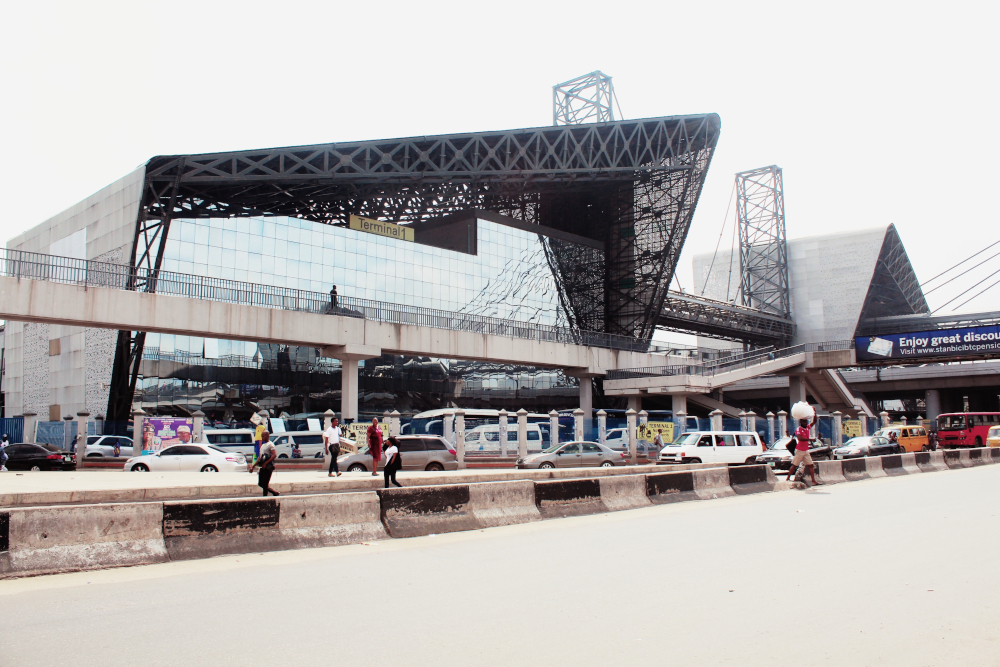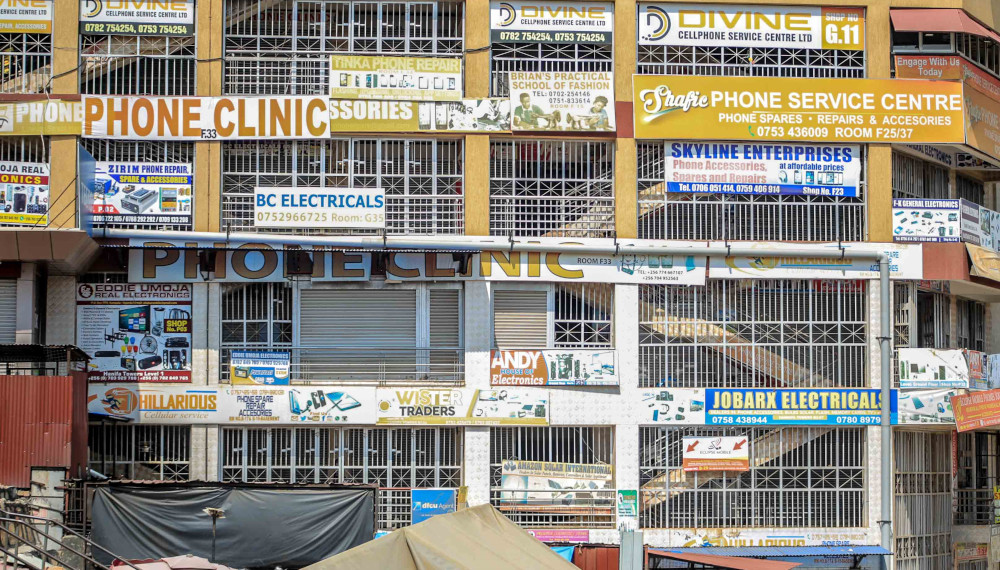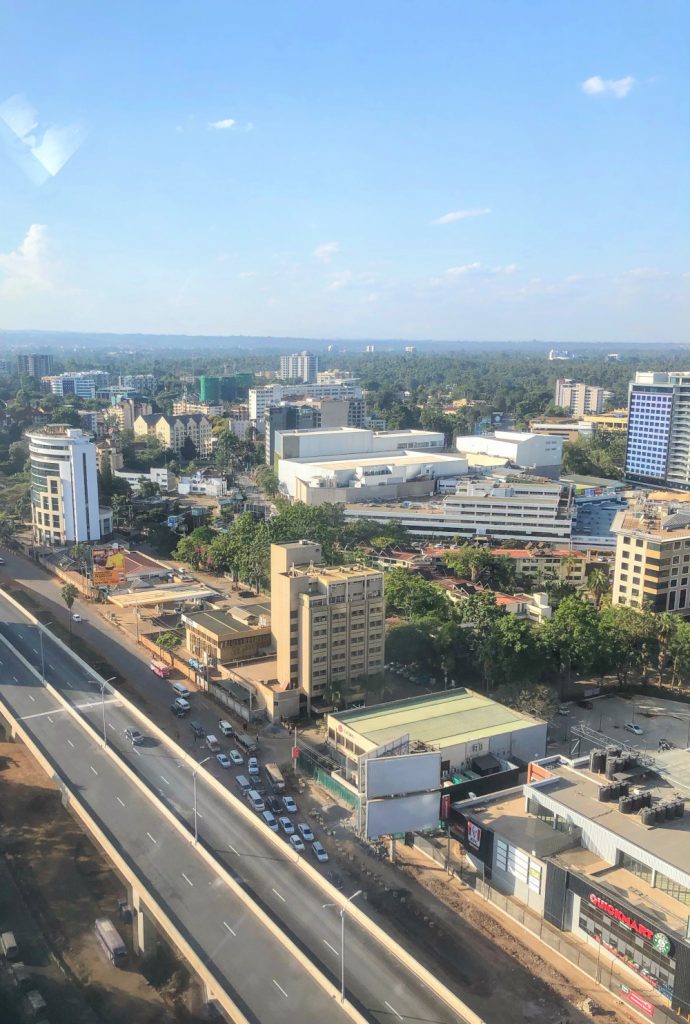In this edition of Spotlight On six authors take up the invitation to reflect on Africa’s possible urban futures. The essays bring new perspectives to the analysis of issues close to IJURR’s heart: the urban state, urban politics, urban planning, land dynamics and housing all feature in these short commentaries on the contemporary dynamics shaping Africa’s cities and urban regions. But they also showcase the exciting new directions that urban research is taking on the continent, examining incremental environmentalism, the politics of urban aesthetics, the lived experience of the entrepreneurial city, the possibilities and challenges of digital infrastructures and the nature of the urban state and peri-urban land markets.

Oshodi Bus Terminal, heralded as a World-Class Bus Terminal and argued by some to have an aesthetic parallel to Dubai and London. Many traders were dispossessed in the process of building the terminal. Photo: Grace Adeniyi-Ogunyankin, 2022.
Taken together the essays in this collection raise urgent questions about the actors, visions and politics of contemporary urban renewal projects across the continent. In Lagos, Grace Adeniyi-Ogunyankin reflects on how young people are both attracted to and repelled by the aspirational project of what she terms ‘owambe urbanism’ that purports to chart the future of the entrepreneurial city. Drawn in to the labour market on unequal terms, young people nevertheless ‘package’ themselves to be seen in the city’s world class consumption spaces in an attempt to improve their prospects by making the right social connections. In Nairobi, Wangui Kimari draws our attention to a different set of responses to top-down visions of city planning among the city’s marginal youth, who are effectively greening the city by planting and gardening in the interstitial spaces created by colonial era urban planning. Kimari sees this urban greening as a political act as much as a practical one of providing sustenance: these young ‘outlaws’ are claiming a space for their future in the city despite being ‘off-staged’ by top-down urban planning. As Claudia Gastrow asks in relation to urban redevelopment in Luanda, who is the city for? She examines the aesthetic inequalities of urban redevelopment in the city, in which elite and middle-class visions of modernity triumph over the material production of the built environment by the urban majority – indeed, often requiring its destruction. In response, Gastrow argues for a ‘democratic aesthetics’ in which the recognition of the aesthetic desires of the residents of the city’s musseques contains the possibility of a more just urban future. Turning to digital infrastructural development projects in urban service provision, Prince Guma argues that urban residents’ everyday interactions with technologies in the street produce different kinds of infrastructural interventions to the ones originally planned by developers. Ranging from tampering, to repair, to sabotage, these urban residents’ reconfiguration of digital infastructures constitutes a ‘smartness from below’ that will ultimately shape the future of digital infrastructure in African cities.

Urban interface of new markets and micro-economies being formed in the digital age, Kampala. Photo: Prince K. Guma, 2021
The last two papers turn our attention to the state and what it is and is not doing in African cities. Divine Asafo takes us to the peri-urban edge of Accra where the speed and scale of land commodification reveals the complex challenges of urban governance in rapidly expanding African cities. In the absence of land titles, people are turning to local traditional authorities, private developers and privately hired land guards in order to secure their claims to land. Finally, Liza Cirolia argues that we need to better understand the configuration of political and infrastructural power in African cities by paying more attention to the urban state. She unpacks the difficulty of identifying the material, territorial and political contours of the urban state in African cities and proposes that we think about the urban state relationally – comprised through relations between different scales of the state, different service providers and infrastructural projects. This is necessary if urban studies is to produce ‘robust imaginaries of the future of the African state’.

The Nairobi Expressway, a toll road in Kenya. Photo: Liza Rose Cirolia, 2022.
IJURR will encourage more submissions from scholars based in Africa. IJURR has published some of the most innovative recent work in English on African urban spaces, from analysis of the urbanisation of prayer camps to labour precarity among informal transport workers and the domestic politics of urban redevelopment. Yet work on and from Africa remains under-represented in the journal. A brief look at the journal’s back catalogue shows that 19 research articles discussing urban Africa were published in the journal’s first two decades. This began to change after the journal published influential pieces by Jennifer Robinson and AbdouMaliq Simone that generated productive debates about urban theory and urban practice in Africa and beyond. There is still much to do, not least in terms of opening up journals like IJURR to a wider range of voices. As the essays published here and collected below from the journal’s last few years demonstrate, a new generation of scholars are writing about, and from, African cities across the continent. This collection provides only a snapshot in terms of geography (limited to Anglophone and Lusophone countries, and to capital cities) but this much is clear: more is coming. This scholarship will be critical for understanding Africa’s urban futures.
Claire Mercer
London School of Economics
IJURR Board Member
November 2022
All essays on African Futures
Introduction: Africa’s Urban Futures
Claire Mercer
City of the Future: Lagos and the Afropolitan Imagineering Project of Owambe Urbanism
Grace Adeniyi-Ogunyankin
‘Colour Ni Green’: Ecological Futures in Nairobi Outlaw Style
Wangui Kimari
Aesthetics and the Making of Urban Futures in Luanda, Angola
Claudia Gastrow
Appropriating and Contesting Digital Infrastructural Futures in Urban Africa
Prince K Guma
Land Commodification and Tenure (In)Security: Spotlight on Peri-urban Accra, Ghana’
Divine Asafo
Centring the ‘Urban State’ in African Urban Governance Debates
Liza Rose Cirolia
Related IJURR articles on African Futures
A Shadowy ‘City of Light’: Private Urbanism, Large-Scale Land Acquisition and Dispossession in Ghana
Austin Dziwornu Ablo, & Bjørn Enge Bertelsen
Conceptualizing African Urban Peripheries
Paula Meth, Tom Goodfellow, Alison Todes & Sarah Charlton
Cities, Creativities and Urban Creative Economies: Re‐descriptions and Make+Shifts from Sub‐Saharan Africa
Jenny Mbaye & Andy C Pratt
Identity Building Through Mediation by African Tailors
Sofia Vilarinho & Henri Christiaans
Infrastructure Disruption in ‘Silicon Savannah’: Exploring the Idea of the Creative Class and their Relation to Quality of Place in Nairobi, Kenya
Lauren Rosenberg & Alan Brent
The Creative Night‐Time Leisure Economy of Informal Drinking Venues
Andrew Charman & Thiresh Govender
The Green Masterplan: Crisis, State Transition and Urban Transformation in Post‐Genocide Rwanda
Shakirah Esmail Hudani
The Real Estate Frontier
Tom Gillespie
Day Zero and The Infrastructures of Climate Change: Water Governance, Inequality, and Infrastructural Politics in Cape Town’s Water Crisis
Nate Millington and Suraya Scheba
Urban States: The Presidency and Planning in Luanda, Angola
Claudia Gastrow
Forefronts of the Sharing Economy: Uber in Cape Town
Andrea Pollio
‘The City of Our Dream’: Owambe Urbanism and Low‐income Women’s Resistance in Ibadan, Nigeria
Grace Adeniyi Ogunyankin
Boundary Work: Becoming Middle Class in Suburban Dar es Salaam
Claire Mercer
Silence and Voice in Nigeria’s Hybrid Urban Water Markets: Implications for Local Governance of Public Goods
Charisma Shonté Acey
Global Urban Policymaking in Africa: A View from Angola Through the Redevelopment of the Bay of Luanda
Sylvia Croese
Urban Fortunes and Skeleton Cityscapes: Real Estate and Late Urbanization in Kigali and Addis Ababa
Tom Goodfellow
Sisyphean Dilemmas of Development: Contrasting Urban Infrastructure and Fiscal Policy Trends in Maputo, Mozambique
Gabriella Y. Carolini
Idioms of Accumulation: Corporate Accumulation by Dispossession in Urban Zimbabwe
Beacon Mbiba
‘No Condition is Permanent’: Informal Transport Workers and Labour Precarity in Africa’s Largest City
Daniel E Agbiboa
Building God’s City: The Political Economy of Prayer Camps in Nigeria
Asonzeh Ukah
